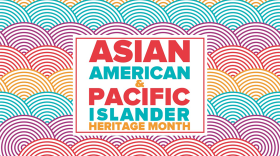The lobby of Saffron Eatery in Las Vegas’ China Town fills with dozens of hungry guests. The women are adorned in elegant Filipinianas, and the men wore traditional barongs. This dining room is usually closed on Monday and Tuesday nights. But this warm summer night is an exception … It’s hosting the Filipino pop-up restaurant Istorya.
“I find that Filipinos to today, our characteristics have always been resourcefulness, perseverance and creative resiliency,” Castillo says. “And you see that in places like the kitchen.”
That’s Walbert Castillo. He founded Istorya in 2022 with the intention to dig into his Filipino heritage. Today, the event has become a food portal into history.
“We ask ourselves not ‘What is Filipino food,’ but what makes it Filipino?”
And that is Castillo’s girlfriend, Monica Blanco, who later joined Istorya as a cofounder.
On this night, Castillo and Blanco celebrate their most recent version of the event. Referred to as “chapters,” each one covers a historical period or theme. This one, Galeón, focuses on how Spanish colonization during the galleon period influenced Filipino cuisine. It’s a 10-course meal full of history lessons you can eat.
While the line continues to grow out Saffron’s front door, the crew in the back of the house stays busy. The clock reads 7:50 … 10 minutes until chow time. Last-minute platings … pastries fresh out the oven … one last pot of Jasmine rice underway.
Castillo says three years of intensive research and an entire day of cooking led to this.
The first course is ensaymada, a slightly sweet bread-like pastry balanced by a salty grated queso de bola – or Edam cheese – topping. Chef Angelique Leslie, one of Galeón’s three lead chefs chose the cheese.
“Chef Angelique was actually very happy when it finally came out the way it did. So, that way, you guys could enjoy it for tonight.”
That’s Ava, a storyteller. As one dish after another emerges, she makes her way around the dining room to give the dishes’ context.
A tempura fried soft-shell crab sits in a creamy Alavar sauce, paying homage to its origin in Zamboanga City, Philippines, where the indigenous still practice Islam – despite the Christian influence Spaniards brought in 1565.
A pancit pusit, made from squid ink, offers a take on Filipino natives’ disapproval of the Spanish theory that the ink was poisonous if ingested. Pieces of calamari and salmon roe sit atop a noodle nest signifying reliance on seafood from the Pacific waters.
Castillo says his favorite dish of the night was the Flan de Leche. The popular dessert was a product of historic construction techniques. Filipinos used egg whites as a binder for limestone to build churches. The leftover egg yolks gave rise to the delectable custard.
Galeón’s two other lead chefs made meaningful contributions too. Chef Joseph “Coco” Lim brought his yakitori expertise with the skewered Ilocos longganisa, and Chef Dio Buan with the salmon Escabeche – a childhood favorite.
With its in-depth menu and approach, Istorya takes diners beyond the popular Adobo and Lumpia to explore less-known Filipino dishes. Along the way, it has fostered a community.
“I didn't really have a lot of Filipino friends until I got here,” Chef Buan says. “When I saw them doing Istorya, that’s when I hit them up,” Chef Buan says.
Istorya’s Galeón chapter will have seatings throughout October. The next part will dive into the Spanish influence on Mexico.
Castillo says they will continue traveling to the Philippines, meeting with historians, retelling their story through a culinary lens.
For tonight, he and Blanco are just enjoying the event’s success.
“I feel proud, because I think a lot of the times when I was growing up, I would have a lot of cultural pride without context,” says Blanco. “It's such a privilege, and at the same time, it feels like such a responsibility to make sure that these stories go heard and are also told in a way that is empowering.”








